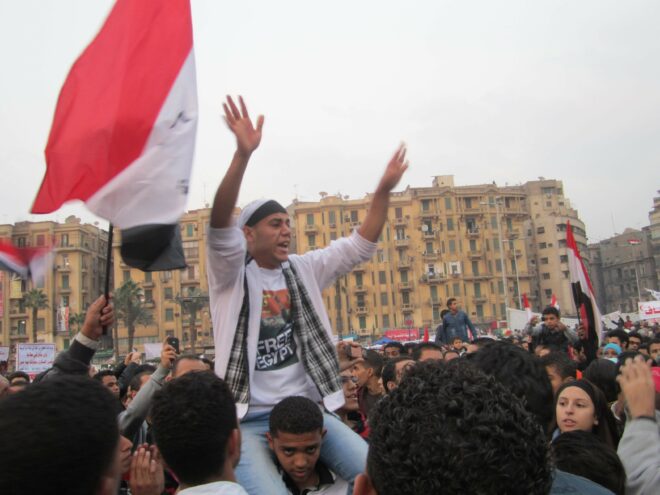Podcast

thbat. Ithbat can be translated as ‘stand still’, ‘steady’ and ‘unshaken’. It was one of the newer chants that were infused into us on the 25th of January 2011 – every time the police launched an offensive, and people started to run, someone would shout “Ithabt” as he or she stopped moving, and then several would shout it, and then tens and hundreds, until thousands would stop. I would close my ears and squeeze my eyes shut and let the thousands of voices shake through me, shake out the fear, and stabilise my resolve.
Although the 25th of January revolution was an explosion, it continued to be leaderful without a single leader, and the chants became the way the thousands that met on the squares in Egypt’s cities and villages, could quickly decide what to do and where to go next. A chant would be shouted by one person, and its message would either capture the imagination of thousands, and drive them, or it would not and it would flop. “The people demand the full of the regime” was the flame that came to us from Tunisia, setting the country on fire; the many chants that called on ‘our families’ to join us for our freedom and theirs inspired tens of thousands to join protests without a second thought for the first time in their lives. A chant can move and mobilise like poetry, it can capture your heart like a song, and it can weave a future before you like a vision. For a chant to garner consensus it had to be as promising as it was beautiful, it was the idea around which people assembled and not the person who chanted it.“
Part of Episode IV: “Choirs of Precarity & Power”
With Claudia Bosse, The Church of Stop Shopping, Alia Mossallam & Florian Malzacher
10. April 2021 – Online live stream
In co-production with brut Vienna
Biography
Alia Mossallam is a cultural historian and writer interested in songs that tell stories and stories that tell of popular struggles behind the better-known events that shape world history. She is currently a EUME post-doctoral fellow of the Alexander von Humboldt Foundation in Berlin where she is writing a book on the visual and musical archiving practices of the builders of the Aswan High Dam and the Nubian communities displaced by it. Some of her writings can be found in The Journal of Water History, The History Workshop Journal, the LSE Middle East Centre paper Series, Jadaliyya, Ma’azif, Bidayat and Mada Masr. In producing her research in different formats, she has tried her hand at playwriting and written “Rawi” in the long-form nonfiction platform 60-pages.
An experimentative pedagogue, she founded the site-specific public history project “Ihky ya Tarikh”, and taught at the American University in Cairo, Cairo Institute for Liberal Arts and Sciences, and the Freie Universität in Berlin.
Related Texts
- The Permanent Temporariness: Ten years after the Egyptian Revolution (2021)
- Strikes, Riots and Laughter (2020)
- النكسة كـ بداية | ثلاثة مشاهد من كفاح السويس (Al Naksa as a beginning. Three scenes from the struggle of Suez, 1967-1974)
- The Prison in Us (2014)
- Revolutions worth remembering (2014)
- On the love of life and Alaa’s detention (2014)
- These are liberated territories (2013)




